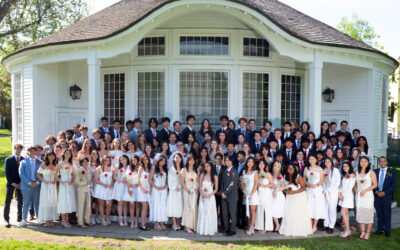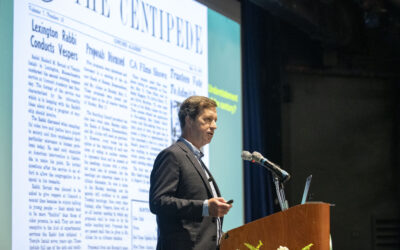“Live In Fragments No Longer: Only Connect.”
– E.M. Forster
One of our deepest needs as human beings is for connection: to feel known, to feel understood, and to feel recognized and valued for who we are. However, in the social distancing culture of Covid-19, our experiences of — and opportunities for — human connection have not only become “fragmented,” but in too many circumstances, they have totally discontinued. For many educators and students in schools around the world, social distancing has led to unbearable states of disconnection, and thereby, to associated feelings of fear, loneliness, anxiety and depression. In essence, this all amounts to an unprecedented, collective, and ongoing experience of loss and to associated feelings of grief.
As I was reflecting on my own varying moods and feelings regarding these multiple losses, I was reminded of psychiatrist Dr. Elizabeth Kubler-Ross’s renowned “Five Stages of Grief.”[1] I first encountered and felt supported by these stages many years ago, but last week, I realized how applicable they are for me now, too. As I thought through these stages, I felt a surprising sense of relief as I realized that my fluctuating – and at times, very challenging — feelings were somehow more understandable and felt more “normal” when considered within this helpful theoretical framework. Even though these five stages were initially presented in a somewhat linear fashion — as if one doesn’t experience the feelings of “stage 2” until having endured or experienced the feelings of “stage 1” — this is not the case. Since the initial publication of Dr. Kubler-Ross’s seminal work in the late 1990’s, practitioners and lay-people alike have acknowledged, over time, how common it is to experience features of all five of these stages simultaneously. That was definitely the case for me.
In a recent Harvard Business Review article, [2] Scott Berinato summarized these five stages of grief rather well. To his summary, I have added brief descriptions to each stage and have paraphrased Berinato’s words here: Denial: An initial refusal that the situation at hand is actually true (“Is this really happening?”); Anger: Strong feelings of annoyance, frustration and irritation at the situation (“Our lives are so disrupted: We want to return to normal life!”); Bargaining: Attempting to negotiate terms for a better outcome (“Ok, if we all shelter in place and maintain social distancing, we’ll be ok, right?”); Depression: Prolonged or intermittent feelings of sadness and discouragement (“I’m so sad, and I don’t know when this whole situation will end.”), and Acceptance: Acknowledging that this really is happening (“This is happening. I need to figure out how to proceed and adapt.”)
As you read through these five stages, I hope you, too, can identify with these feelings, and perhaps, can find some comfort in the realization that you are not alone. In fact, from much of the reading I have been doing throughout this crisis, I have observed that people all around the world are experiencing very similar feelings, confirming Dr. Kubler-Ross’s initial perception, if not her conviction, that these stages of grieving are universal.
Without a doubt, because CA is such a united school community, we are, collectively, experiencing multiple and simultaneous losses: the loss of not being able to gather for meetings and classes; the loss of not being able to meet friends and colleagues for meals in the Stu-Fac; the loss of not sharing springtime on the quad; the loss of not being able to celebrate — in person — CA’s traditional and time-honored year-end rituals and ceremonies, and perhaps mostly, the deeply felt loss of not being able to just hang out with each other as we usually do.
To be sure, these are profound losses. Please know that it is absolutely normal and healthy to respond to these losses with the varied feelings of grief they evoke. Further, in the words of Scott Berinato of HBR, [3] “If we can name it, perhaps, we can manage it.” In my 30-plus years of being a psychotherapist, one thing I have observed and have come to know deeply is that language — “naming it” — is one of the greatest organizers of our emotional experiences. Why else do you think Sigmund Freud termed the process of psychotherapy as “the talking cure?” As we continue to muddle through the coming weeks and months, my hope for our entire CA community is that the “language” of these Five Stages of Grief can provide a useful emotional framework within which to understand, and perhaps, manage our feelings.
To conclude, I also want to offer a message of hope. Another one of Dr. Kubler-Ross’s well-known quotations is this: “The most beautiful people we have known are those who have known defeat, known suffering, known struggle, known loss, and have found their way out of those depths.” To all of you, please have the courage to “name your feelings,” and recognize that while we are, indeed, experiencing “suffering, struggle and loss,” we are also a cohesive, attentive and deeply caring community that can and will join forces to “find our way out of those depths” together as we strive to “live in fragments no longer, and only connect.”
David Gleason, Psy.D.
Consulting Psychologist
[1] Kubler-Ross, E., On Death and Dying. Scribner Publishing, 1997
[2] https://hbr.org/2020/03/that-discomfort-youre-feeling-is-grief
[3] https://hbr.org/2020/03/that-discomfort-youre-feeling-is-grief


